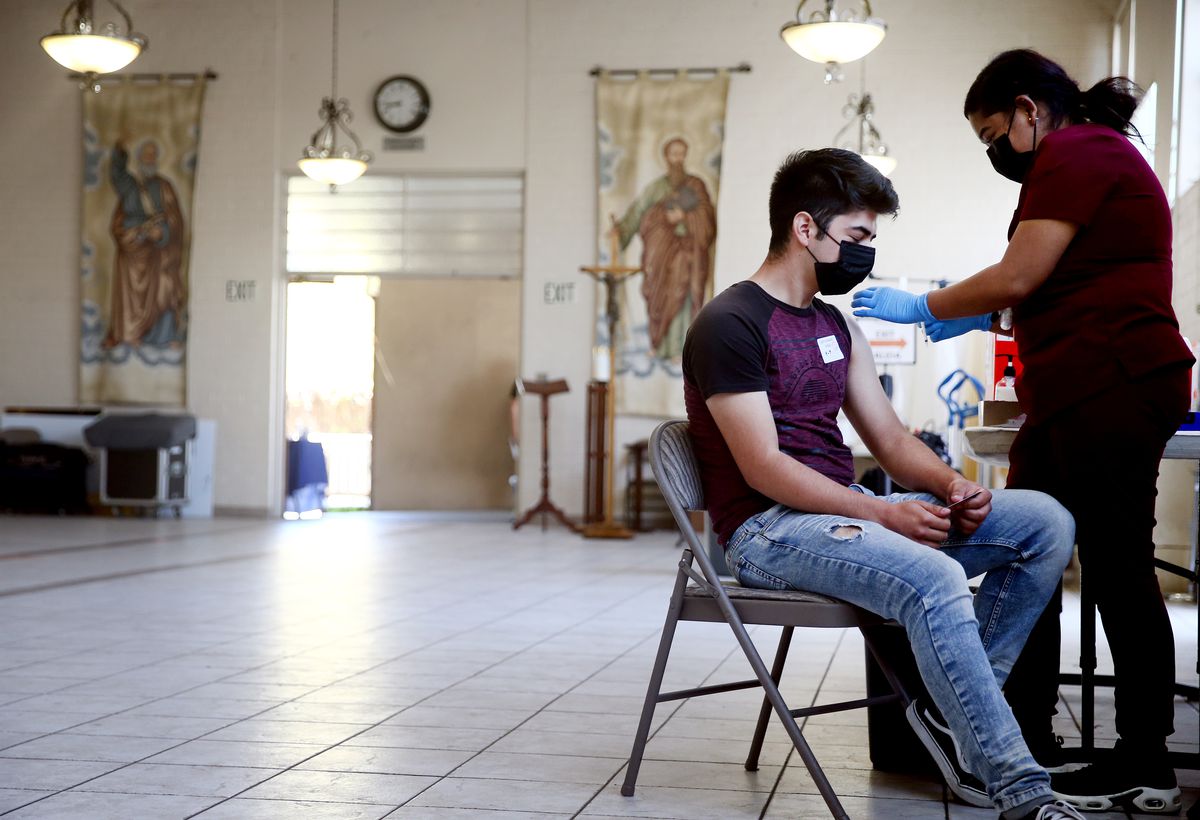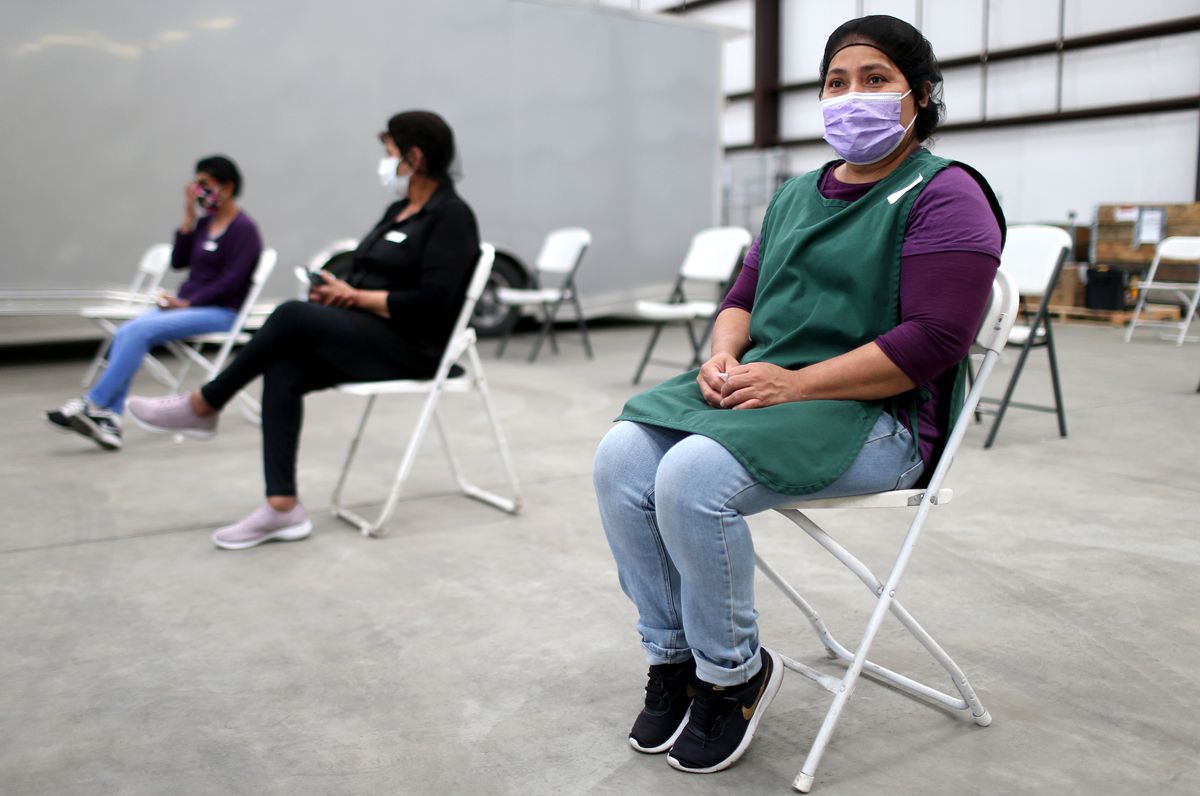For many, COVID-19 vaccines come with a side of side effects
Getting a COVID-19 vaccine comes with a lot of benefits. There’s the protection against a world-altering virus, the ability to travel more safely, and hanging out in people’s houses again. There are also doughnuts. But there’s also a pretty good chance that a vaccine will be accompanied by a few unwelcome side effects. Most of these are pretty benign — like a sore arm or fatigue. Some are more serious, but those are also extremely rare.
Here’s a cheat sheet to help you figure out what to expect after your COVID-19 shot.
What are some common side effects?
Your arm might feel sore after you get the shot, and there might be some redness or swelling near the injection site. There’s also a chance that you could develop a headache, fever, muscle pain, chills, fatigue, or nausea.
This is all according to the Centers for Disease Control and Prevention (CDC) which has a helpful page about side effects.
What if I notice something else, not on that list?
The CDC’s list is of the most common side effects — there may be others that occur less frequently, or that haven’t shown up in studies yet. Researchers are still gathering data on vaccines and their side effects. In fact, one brand-new study is looking for a possible connection between vaccines and irregular menstrual cycles.
As with any medical treatment, take note of your symptoms and if any concern you, talk to your doctor.
If you’re in the US and you want to help researchers gather data about vaccine side effects, you can also enroll in the CDC’s v-safe program once you get your shot. It’s a smartphone-based system that asks you about your side effects after you get vaccinated.
I’ve heard it’s the second shot that gets you — is that true?
Yes, if you get a two-dose vaccine like Pfizer or Moderna, your symptoms may be more intense after your second shot than they were after your first. It’s not inherently a bad thing — it means that your body has learned its lesson from the first dose, and your immune system is now ready to fight off the coronavirus that causes COVID-19.
“Your body is primed by that first dose of vaccine.” said Melanie Swift, co-chair of the COVID-19 Vaccine Allocation and Distribution Work Group at Mayo Clinic in a Q&A. “The second vaccine dose goes into your body, starts to make that spike protein, and your antibodies jump on it and rev up your immune system response. It’s kind of like they’ve studied for the test. And it’s acing the test.”

Who is more likely to get side effects?
Younger people are more likely to see side effects. The immune system gradually weakens as you get older, this is called immunosenescence. Younger people’s immune systems are more likely to react strongly to a vaccine, making them more likely to feel side effects as their bodies go through a practice run of fighting off an infection.
Women are also more likely to report side effects after getting a shot. Many women tend to have stronger immune responses to vaccines in general, and the COVID-19 vaccines are no different. But other factors, including gender bias in trial design, and inconsistent reporting might also play a role.
I know I’m going to be sore — should I take something ahead of time?
No. “It is not recommended you take over-the-counter medicine – such as ibuprofen, aspirin, or acetaminophen – before vaccination for the purpose of trying to prevent vaccine-related side effects.” the CDC’s page on preparing for your COVID-19 vaccination says. Researchers aren’t sure if those medications might change how well the vaccines work, so they ask that people hold off, and don’t take those pain relievers, or antihistamines ahead of your appointment.
After your appointment is a bit of a different story. While the CDC still recommends talking to your doctor before you decide to take medicine, it also says that you can take over the counter medications “to relieve post-vaccination side effects if you have no other medical reasons that prevent you from taking these medications normally.”
If you are sore after your shot, the CDC recommends putting a cool washcloth over the site and moving your arm around.
Are some vaccines more likely to cause side effects than others?
Looks like it. A study published this week found that people who got Moderna’s vaccine were more likely to say they experienced side effects than people who got the Pfizer/BioNTech shot.
Both vaccines are still considered to be safe and effective.

What about the rare, scary side effects?
There have been some instances of people having a severe allergic reaction to their shots — severe enough that they need to take epinephrine or go to a hospital. That’s one reason why people are asked to hang around for medical observation for about 15 minutes after they get their vaccine.
Other people might have what is still considered an ‘immediate’ allergic reaction (hives, wheezing, swelling) within four hours of their shot. In those rare cases, or if you are allergic to something in the shots, doctors may advise you to get a different vaccine.
Outside the US, some researchers have noticed that in very rare instances, some people who get AstraZeneca’s COVID-19 vaccine develop serious blood clots. This may be because of an unusual antibody reaction, but it’s still not certain what’s causing the clots, or who is at highest risk, though it does appear to be safer in older people. This particular vaccine is not authorized for use in the US.
When should I worry about side effects?
The CDC recommends that you talk to a doctor if your side effects don’t go away after a few days, or they start worrying you.
If I don’t have side effects, does that mean that it’s not working?
While it is true that side effects are a sign that your body is building up its COVID-19 defenses, if you don’t have them, that doesn’t mean that the vaccine isn’t working. You’re still protected, you just happen to be one of the lucky people whose immune system isn’t being a total jerk to you.
Here’s what else happened this week.
Antivirus will be taking a break next week, April 17th. We’ll be back on April 24th.
Research
What are we waiting for?
This week, my colleague Monica Chin asked a host of experts what kinds of measures we were looking for in order to resume activities like travel, theater, and other things that have been considered high risk for the past year. It’s well worth the read. (Monica Chin/The Verge)
Has the Era of Overzealous Cleaning Finally Come to an End?
This week the CDC updated its cleaning guidelines, emphasizing that the chance of catching the virus from a surface is just 1 in 10,000. That’s a big change from earlier in the pandemic, when we were all washing everything that came into our homes. Cleaning is still important — especially around someone with an active infection, but many experts now think the bigger risk of transmission is through the air. (Emily Anthes/The New York Times)
Development
Researchers Are Hatching a Low-Cost Coronavirus Vaccine
Some scientists are starting trials of a low-cost vaccine that’s easier to make than alternatives. If it works, it could make a big difference in the push for global vaccination. (Carl Zimmer/The New York Times)
Scientists work toward an elusive dream: a simple pill to treat Covid-19
Antiviral drugs are incredibly difficult to develop, but some researchers are still hoping they can find “a Tamiflu for SARS-CoV-2.” It’s a highly complicated mission that is definitely easier said than done. (Damien Garde/STAT)
Perspectives
She grew up in Hungary, daughter of a butcher. She decided she wanted to be a scientist, although she had never met one. She moved to the United States in her 20s, but for decades never found a permanent position, instead clinging to the fringes of academia.
— In a moving profile for The New York Times, journalist Gina Kolata describes the extraordinary life of Katalin Kariko, an mRNA researcher whose work has been critical to the current push to develop COVID-19 vaccines.
More than Numbers
To the people who have received the 748 million vaccine doses distributed so far — thank you.
To the more than 134,719,328 people worldwide who have tested positive, may your road to recovery be smooth.
To the families and friends of the 2,915,972 people who have died worldwide — 561,074 of those in the US — your loved ones are not forgotten.
Stay safe, everyone.
https://www.theverge.com/2021/4/10/22377030/side-effects-covid-19-vaccine-antivirus-newsletter